The Transformation of Allegiance
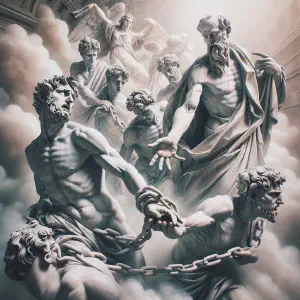
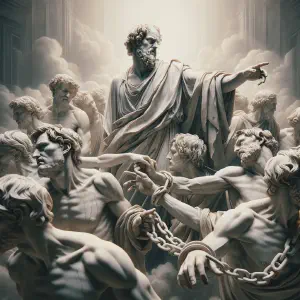

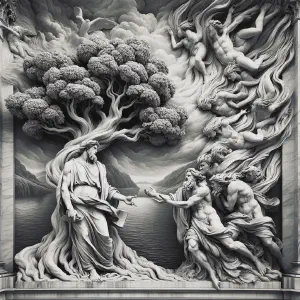
Thus, the story of their faith unfolded—a tale of turning away from the wages of sin, which is death, to embrace the gift of God: eternal life in Christ Jesus. It was a story of choosing sides in a cosmic battle, a declaration of hope in the Lord, and the sanctifying journey toward eternal life.
Five Questions
What does Paul mean when he refers to presenting our bodies as slaves to impurity and then as slaves to righteousness?
Paul’s using the metaphor of slavery to make a contrast between two types of obedience. When he talks about presenting our bodies as slaves to impurity, he’s referencing a life lived under the dominion of sin, where our actions are bound to our own corrupt desires. Conversely, being slaves to righteousness means dedicating ourselves fully to God’s will, leading to sanctification, which is the process of becoming holy.
How does the Responsorial Psalm complement the message Paul is delivering in the first reading?
The Psalm describes the life of a person who delights in the law of the LORD as being blessed and prosperous, akin to a tree planted by streams of water. This imagery of growth and prosperity echoes Paul’s message about the fruits of living a life in accordance with God’s will. Both texts emphasize the contrast between the righteous path that leads to life and the wicked path that leads to ruin.
In the Gospel, Jesus speaks about coming to set the earth on fire and bringing division rather than peace. How should this be interpreted?
Jesus is using vivid language to describe the transformative power of the Gospel. The fire He speaks of symbolizes purification, judgment, and the presence of the Holy Spirit. The division He mentions refers to the inevitable conflict that arises when individuals choose to follow Him. His message demands a response, and that response can lead to division, even among close family members, because not everyone will choose to follow.
How does the concept of suffering play into this narrative, particularly with the baptism Jesus mentions?
The baptism Jesus refers to is a metaphor for the suffering and death He will endure. It’s a crucial part of the narrative because it’s through His suffering that salvation and eternal life are made possible. This ‘baptism’ signifies not only the anguish He faced but also His commitment to fulfilling God’s plan for humanity’s redemption.
What is the ultimate message these scriptures are trying to convey to the faithful?
The ultimate message woven throughout these scriptures is one of transformation and choice. They encourage the faithful to turn from a life of sin to one of righteousness, to understand the cost of discipleship, and to recognize the powerful change that comes from following Christ. They promise that despite the challenges and divisions, the path of righteousness leads to eternal life, which is the gift of God through Jesus Christ our Lord.
Bible Study
Reading 1: Romans 6:19-23
Brothers and sisters:
I am speaking in human terms because of the weakness of your nature.
For just as you presented the parts of your bodies as slaves to impurity and to lawlessness for lawlessness,
so now present them as slaves to righteousness for sanctification.
For when you were slaves of sin, you were free from righteousness.
But what profit did you get then from the things of which you are now ashamed?
For the end of those things is death.
But now that you have been freed from sin and have become slaves of God,
the benefit that you have leads to sanctification, and its end is eternal life.
For the wages of sin is death, but the gift of God is eternal life in Christ Jesus our Lord.
Saint Paul the Apostle, author of Romans, provides a theological reflection on sin and righteousness. He employs the metaphor of slavery to contrast a life dominated by sin with one surrendered to God’s righteousness. This passage highlights the inherent human weakness and the transformative power of God’s grace. It aligns with the Catholic values of repentance, conversion, and the sanctity of striving for holiness. The concept of “death” as the consequence of sin correlates with the wages of sin delineated in the Ten Commandments and Catechism, while “eternal life” underscores the ultimate promise of faith and grace through Jesus Christ. The passage reinforces the act of mercy in converting the sinner and the sanctifying grace that comes from living in accordance with God’s will.
Responsorial Psalm: Psalm 1:1-2, 3, 4 and 6
R. (Ps 40:5) Blessed are they who hope in the Lord.
Blessed the man who follows not the counsel of the wicked
Nor walks in the way of sinners, nor sits in the company of the insolent,
But delights in the law of the LORD and meditates on his law day and night.
R. Blessed are they who hope in the Lord.
He is like a tree planted near running water,
That yields its fruit in due season, and whose leaves never fade.
Whatever he does, prospers.
R. Blessed are they who hope in the Lord.
Not so the wicked, not so; they are like chaff which the wind drives away.
For the LORD watches over the way of the just, but the way of the wicked vanishes.
R. Blessed are they who hope in the Lord.
The Psalmist contrasts the life of the righteous with the fate of the wicked. The righteous, exemplified by their adherence to God’s law and their hope in the Lord, are blessed and prosperous. This Psalm echoes the Beatitudes and the promise of divine providence found in the New Testament. The image of a fruitful tree aligns with the Catholic value of spiritual growth and the grace that comes from a life anchored in God’s word. It encourages the acts of mercy that involve instructing, advising, and comforting the doubtful, all within the embrace of hope and God’s protective gaze.
Alleluia: Philippians 3:8-9
R. Alleluia, alleluia.
I consider all things so much rubbish that I may gain Christ and be found in him.
R. Alleluia, alleluia.
Saint Paul, in his letter to the Philippians, communicates the supreme value of knowing Christ, a theme that is central to Catholic spirituality. He dismisses all worldly gains as loss for the sake of Christ, encapsulating the Catholic call to humility and detachment from materialism. This resonates with the Catholic understanding of grace, as the passage speaks to the righteousness that comes from God and the transformative relationship with Christ. It also ties in with the Catechism’s teachings on the necessity of faith and the sacrifice inherent in following Jesus.
Gospel: Luke 12:49-53
Jesus said to his disciples:
“I have come to set the earth on fire, and how I wish it were already blazing!
There is a baptism with which I must be baptized, and how great is my anguish until it is accomplished!
Do you think that I have come to establish peace on the earth?
No, I tell you, but rather division.
From now on a household of five will be divided, three against two and two against three;
a father will be divided against his son and a son against his father,
a mother against her daughter and a daughter against her mother,
a mother-in-law against her daughter-in-law and a daughter-in-law against her mother-in-law.”
Jesus Christ, the central figure of Christianity, speaks prophetically about the radical nature of His mission and its divisive consequences, even among close family relations. This passage touches on the transformative and often challenging nature of Christian discipleship, which can lead to conflict due to differing beliefs and values. It underscores the Catholic principle that following Christ may require profound personal sacrifice and can lead to societal upheaval, as one’s allegiance to the Gospel takes precedence over familial ties. This division is not the end in itself but a reflection of the serious commitment to truth and righteousness that Christ’s message demands, which is an essential part of the journey toward grace and ultimate reconciliation with God.
Lessons
In the humility of our human condition, these sacred texts from Romans, Psalms, Philippians, and Luke’s Gospel invite us to contemplate the profound journey from sin to sanctity. Saint Paul’s metaphor of slavery to sin versus righteousness reminds us of the transformative grace that calls us to sanctification, echoing the psalmist’s depiction of the righteous as a flourishing tree, deeply rooted in hope and God’s eternal law. Amidst this spiritual growth, we are encouraged to regard worldly attachments as loss compared to the surpassing worth of knowing Christ. The sobering words of our Savior in Luke warn of the inevitable divisions that truth may bring, even within our families. Yet, in embracing these trials, we are ushered towards the eternal promise of salvation. These passages collectively teach us that true discipleship may demand sacrifice, but it also leads us toward an unshakeable hope and the ultimate gift of eternal life through Jesus Christ.
Meditation Prayer
Almighty and Everlasting God, we come before You with hearts full of gratitude for the gift of Your Word, a lamp unto our feet in this world of shadows. We thank You for the teachings of Saint Paul, who so vividly illustrates the journey from the bondage of sin to the freedom found in righteousness. As we reflect on his words, we are reminded of our own frailties and the redemptive power of Your grace.
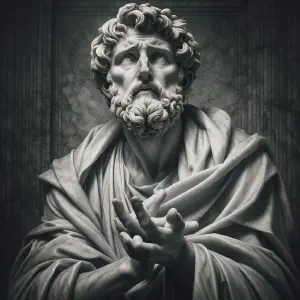

Lord Jesus, Your Gospel reminds us that the truth can be a sword that divides, yet let us not shy away from its edge, but rather let it carve out a place in us for Your Spirit to dwell. May the challenges we face in our families and communities not deter us but instead deepen our commitment to walk in Your way.
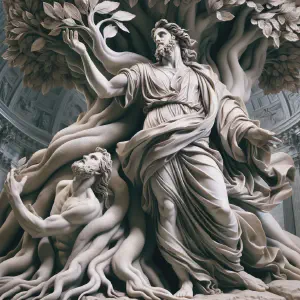
Inspired by these readings, we ask for the courage to present ourselves as instruments of Your peace and righteousness. Let us move forward with the call to action to live in accordance with Your holy will, spreading the fire of Your love to all corners of the earth. In Your most holy name, we pray.
Amen.